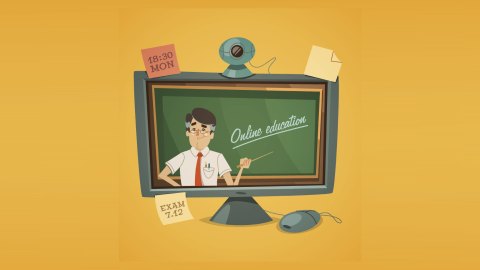Can Online Learning Ever Beat the Real Thing?

To most, the question of whether online learning can beat the real thingprobably sounds rhetorical: Of course — one assumes, a real teacher in a real classroom must always be better than learning through a screen. The case against online learning has been made in a series of strongly worded critiques of “massive open online courses” (MOOCs), however in a recent article in Nautilus, Barbara Oakley, an engineering professor at Oakland University, has made a strong case to the contrary. Oakley describes a variety of “terrific pedagogical advantages” that can be applied in online learning environments that are difficult or impossible to apply in a real-life environment.
Oakley explores how skillfully recorded films can engage students by using techniques of visual trickery to enable a teacher to become a part of the material being taught in an immersive audio-visual experience: “One of the tricks used by many of the past greats in science has been to imagine themselves transported into what they’re trying [to] understand. [Albert] Einstein famously imagined himself chasing a beam of light to help him formulate theories of relativity. Nobel Prize winner Barbara McClintock imagined herself in the realm of the ‘jumping genes’ she became famous for discovering. We can help our students to develop the same sort of intuition as these Nobel Prize winners by bringing objects to life in video in a way that’s virtually impossible to do in a classroom. We can walk into the mitochondria of a cell, or the ionic interaction that sparks an aurora, or the spiralling epiphany of Euler’s equation.”
We can help our students to develop the same sort of intuition as these Nobel Prize winners by bringing objects to life in video in a way that’s virtually impossible to do in a classroom.
Oakley is well-placed to comment on such a topic; she recently taught a class on the psychology of learning that I participated in along with nearly a million other students last year. Oakley argues that by using a green screen and immersing herself in the learning experience, students may experience reduced cognitive load from not having to divide their attention among two or more things at once. But the potential benefits of online learning aren’t limited to capturing students’ attention.
An obvious, but easy-to-underestimate benefit of online learning is that learners can pause, rewind, repeat, and slow down or speed up their virtual teachers, tools that can be particularly useful when dealing with technically challenging topics such as maths and engineering.
Another key benefit of online learning observed by Oakley is the ability to embed low-stakes quiz questions within lesson videos, ensuring that students don’t progress until they have demonstrated to themselves that they have understood what they have learned. As we’ve discussed previously, this form of low-stakes practice testing is one of the single most effective ways of improving retention of information, scoring above every other learning technique except “distributed practice” in a review of controlled trials of learning techniques.
“[L]earning can’t all be interaction” and when it comes to less-interactive lessons, if done well, online learning has the potential to stand far above traditional “talk-and-chalk” teaching practices of old.
I must admit, I’m biased. The explosion of MOOC’s that has occurred over recent years has allowed me to take courses in my spare time ranging from law to game theory and from public health to science writing. Courses that were all delivered by leaders in their fields, such as Dan Ariely, and provided by institutions including Stanford, Duke University, and Caltech, all of this without spending a penny. Something that would have been difficult to even imagine just a decade ago. Whenever I ran into a problem, I could dip into the course forums and partake in a high-quality debate with dozens of other students who were all tackling the same problems at the same time. With a similar platform to that used by Reddit, the wisdom of the crowd shines through. The best responses amongst hundreds of students are upvoted, providing arguably a far higher level of debate than might occur in your average classroom.
Obviously there are many aspects of real-world teaching that online learning can never replace — namely hands-on interactive teaching, group work and one-to-one interaction — but Oakley makes a powerful case that “learning can’t all be interaction” and when it comes to less-interactive lessons, if done well, online learning has the potential to stand far above traditional “talk-and-chalk” teaching practices of old.
—
Follow Simon Oxenham on Twitter, Facebook, Google+, RSS, or join the mailing list to get each week’s post straight to your inbox. Image Credit: Shutterstock/Doremi





